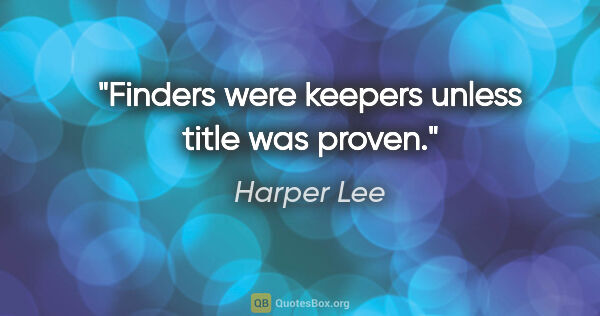Title Quotes (page 8)
I told him that if we doubted that we are demons in Hell, he should read The Mysterious Stranger, which Mark Twain wrote in 1898, long before the First World War (1914-1918). In the title story he proves to his own grim satisfaction, and to mine as well, that Satan and not God created the planet earth and "the damned human race." If you doubt that, read your morning paper. Never mind what paper. Never mind the date.
Kurt Vonnegut
... A CLOCKWORK ORANGE- and I said: 'That's a fair gloopy title. Who ever heard of a clockwork orange?' Then I read a malenky bit out loud in a sort of very high type preaching goloss: '- The attempt to impose upon a man, a creature of growth and capable of sweetness, to ooze juicily at the last round the bearded lips of God, to attempt to impose, I say, laws and conditions appropriate to a mechanical creation, against this I raise my swordpen-
Anthony Burgess
Then the syncretist Ficino, sitting hunched with Lorenzo standing at his side, put all the ideas together, along with Lorenzo's new song: chariots blazing between the worlds as gods fought rebel gods, the destruction of a city -- a planet? -- by fire, beasts beyond imagining both to terrify and befriend the heroes."It needs a title," Signorina Scala said. Pulci had his mouth open, but Ficino beat him to the pun."It shall be dedicated to Isis and Mars," he said, "and we will call it Stella...
John M. Ford
We have to look at the figures of speech a writer uses, his images and symbols, to realize that underneath all the complexity of human life that uneasy stare at an alien nature is still haunting us, and the problem of surmounting it still with us. Above all, we have to look at the total design of a writer's work, the title he gives to it, and the his main theme, which means his point in writing it, to understand that literature is still doing the same job that mythology did earlier, but...
Northrop Frye
This was in [Orwell's] 1946 'Politics and the English Language,' an essay that despite its date (and its title's basic redundancy) remains the definitive SNOOT statement on Academese. Orwell's famous AE translation of the gorgeous 'I saw under the sun that the race is not to the swift' in Ecclesiastes as 'Objective consideration of contemporary phenomena compels the conclusion that success or failure in competitive activities exhibits no tendency to be commensurate with innate capacity, but...
David Foster Wallace
ladies & gentlemen," the Professor began, "the Other Professor is so kind as to recite a Poem. The title of it is 'The Pig-Tale.' He never recited it before!" (General cheering among the guests.) "He will never recite it again!" (Frantic excitement, & wild cheering all down the hall, the Professor himself mounting the table in hot haste, to lead the cheering, & waving his spectacles in one hand & a spoon in the other.)
Lewis Carroll
And on the subject of burning books: I want to congratulate librarians, not famous for their physical strength or their powerful political connections or their great wealth, who, all over this country, have staunchly resisted anti-democratic bullies who have tried to remove certain books from their shelves, and have refused to reveal to thought police the names of persons who have checked out those titles. So the America I loved still exists, if not in the White House or the Supreme Court or...
Kurt Vonnegut
That brings me to the real reason for the title: Where does that which happens during reading a book take place? (...) Does not every reader, whether he wants it or not, bring (...) his own experiences and thoughts into the process of reading? (...) Is not every book a mirror in which the reader is reflected, whether he knows it or not? And is not every reader a mirror in which the book is reflected?
Michael Ende

Ok now--I don't read "all the time." Remember, that these ratings are over quite a while. I'll try to put in some comments over what I've been reading lately. I like Vince Flynn's spy/thrillers. Also, check out Umberto Eco's one "On Beauty"--not the precise title, but great art/comments. Also, Sophie's World if you like a pretty unusual story with philosophy mixed in.
Umberto Eco


